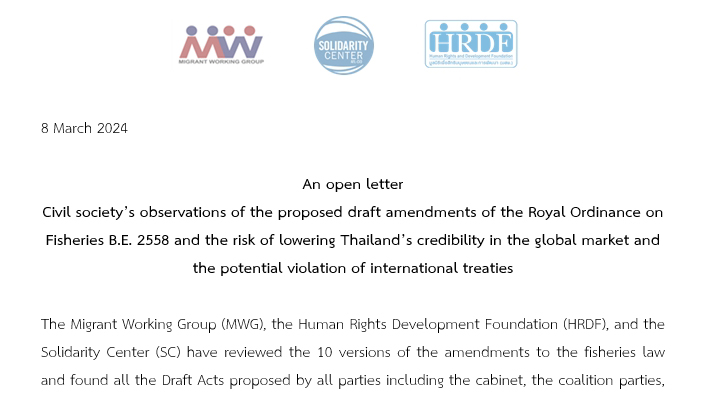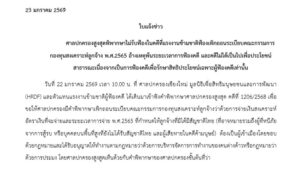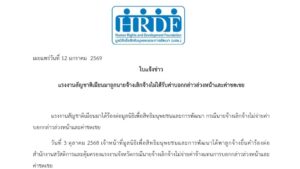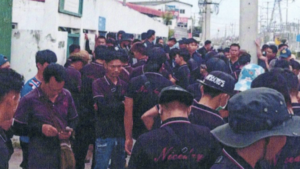
8 March 2024
An open letter
Civil society’s observations of the proposed draft amendments of the Royal Ordinance on Fisheries B.E. 2558 and the risk of lowering Thailand’s credibility in the global market and the potential violation of international treaties
The Migrant Working Group (MWG), the Human Rights Development Foundation (HRDF), and the Solidarity Center (SC) have reviewed the 10 versions of the amendments to the fisheries law and found all the Draft Acts proposed by all parties including the cabinet, the coalition parties, the opposition parties and the National Fisheries Association of Thailand, share similar issues. This shows the common direction of all the Draft Acts for the amendment with a few nuances in the detail. In general, all the Draft Acts focus on offering leniency in terms of the law enforcement toward the violation of fisheries law with softening approaches on various issues including fishing, at-sea trans-shipment, fishing gear, at-sea crew transfer, administrative measures and criminal punishment.
The similar Draft Acts clearly show the direction of the new law and the voting of the final draft should not yield so different provisions. However, if the amended law is enacted, it may give rise to the commission of more illegal fishing, overfishing, and violation of labour rights among the fishers in Thailand while the measures and sanctions against the offenders become weaker.
Observation 1 General Provision of the Draft acts amending of the Royal Ordinance on Fisheries B.E…….
- the labour protection and the use of illegal labour in fishing sector has been repealed from the Draft Acts, even though it is a critical issue and garners attention from international organizations. The use of illegal labour in fishing sector is among key concerns shared by TIP Office and EU.
- The drafts impose a punishment aiming to suppress and prevent the violations. The imposition of punishment is based on the Utilitarian Theory whereby such punishment should elicit a deterrence to prevent the recommission of the crime in the future.
Observation 2 The Committee in the Draft Acts
- The removal of representatives from the Ministry of Labour from the Committee.[1] As a result, the Committee in the Draft Acts is not composed of law enforcement officials for labour protection which gives rise to the restriction on the application of the administrative measures when there is a violation of labour rights on the fishing vessel given the lack of context of labour protection of the Committee.
- In addition, no provisions in all the Draft Acts portend to demonstrate an enhanced collaboration of mechanisms under all the Committees. This gives rise to a concern about their efficacy and how they can streamline their cooperation.
Observation 3 The issuing of licenses to commercial fishing and the amnesty to previous violators against fishing law[2]
If the Draft Act gets a nod from the Vetting Committee, it will enable a fishing vessel whose license has been revoked for more than two years to reapply for a license. The Draft Acts also remove a provision in (5) which prohibits the person whose fishing license has been revoked less than five years ago from reapplying for the license. Therefore, the provision appears to be an amnesty offered to the fishing vessel and previous offender whose license has been revoked by the administrative measures when the previous law still applied
Observation 4 Permission for at-sea trans–shipment of catch
All the Draft Acts allow all fishing vessels which notify the Port-in Port-out (PIPO) Centers to carry out such at-sea trans-shipment of catch. In addition, all the Draft Acts allow the fishing vessels which make the notification of fish trans-shipment to dock at the pier. The Draft Acts clearly give permission for fish transshipment inside and outside the Thai waters. Such fish transshipment gives rise to three risks including overfishing, fishing through illegal methods and untraceability of the fish’s origin and the use of forced labour given the long period at sea of the fishing vessels.
Observation 5 Providing a crew list and Seabook
All the Draft Acts seek to amend the current law to make it unnecessary for a fishing vessel to provide a crew list and Seabooks of workers in the fishing vessel. Moreover, in the draft prepared by the coalition parties prescribes that “If necessary, the fishing vessel that sets sail for fishing can give a lift to seamen or crew members with permits and Seabook to bring them to another fishing vessel whose permission has been acquired.”
,
The amendment to both issue of concerns may give rise to a potential violation of labour rights in fishing sector since from now on, it is not necessary for a fishing vessel’s owner or a concerned person to provide important information or documents as part of the inspection of the fishing vessel to verify if the use of labour is legal or not.
Until now, such information and documents are important evidence which can lead to the rescue of survivors of human trafficking in fishing vessel and to ensure their access to legal rights. Such information and documents can also be used as evidence to ensure access to legal rights upheld in the labour protection law as well. .
Observation 6 ADMINISTRATIVE MEASURES
- Administrative measures disproportionate to the offence
The Draft Acts prescribed two tiers of administrative measure including;
- Suspension or suppression of license for up to sixty days for first-time offence, and for up to ninety days for second-time offence[3]
- Seizure or revocation of license, after two years of which a reapplication can be made.
Such timeframe may not be proportionate to the gravity of the offence which appears to infringe on public interest. For such infringement, it is necessary for the offender to offer remedies as well, i.e., for the offence concerning the use of illegal fishing gears which may lead to the destruction of natural resources, catching of prohibited fish, or using stateless fishing vessels for fishing, etc.
- Allowing the person targeted by administrative measures to evade criminal liability
The Draft Acts by political parties, except the draft by the cabinet,prescribe that following a sanction imposed by the Administrative Measure Committee against the offender, the criminal liability on the same offence pursuant to the Royal Ordinance shall cease.
This provision may bring down the number of the offenders who face criminal liabilities since the imposition of administrative measures by the Administrative Measure Committee can go through a shorter process when compared to the judicial process.
Observation 7 Sanctions
- Revoke imprisonment for all kinds of offence. To repeal the imprisonment, it must clearly spell out reasons and necessities and offers a substitute sanction in order to deter the recommission of the crime
- The reduction of fine for various offences. In the Draft Acts, the monetary sanctions are being reduced significantly and disproportionately when taking into account the extent of the damage done, and this may give rise to the incredibility of the criminal justice process.
- The imposition of sanctions should be made proportionate to the context of fishery. It should be based on the damage done to natural resources and human beings. Therefore, the monetary sanctions imposed must be made up to the level that they can sufficiently ensure full recovery from the damage.
Based on the above observations, the Migrant Working Group (MWG) and its allied organizations fervently hope that the observations of the Draft Acts will be considered and review to prevent
the legal amendment which may give a risk to the lower credibility of Thailand in the world market. It should show Thailand’s commitment to addressing labour problems in fishing sector in compliance with the International Labour Organization Convention no. 188 on Work in Fishing Convention, 2007, to which Thailand is a state party and the international framework for the prevention of Illegal, Unreported and Unregulated fishing or IUU Fishing.
Migrant Working Group (MWG)
8 March 2024
[1] Section 112 of the existing Royal Ordinance
[2] Section 39 of the existing Royal Ordinance
[3] Section 117




